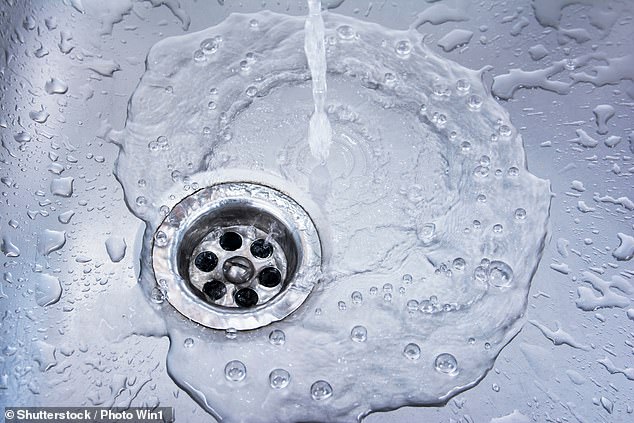Greedy water companies should go bankrupt instead of increasing our bills, says SAM BARKER
Let’s all shed a tear for those poor, beleaguered water companies.
Not only do they face annoying questions about why they pump so much sewage into seas and waterways, now many have to increase household water bills to ensure good service.
Some want to nearly double customers’ water bills between 2025 and 2030.
That’s right: water companies are asking regulator Ofwat for permission to increase bills by as much as 84 percent by 2030 to pay for improving the country’s pipes and sewers.
Troubled Waters: Water utilities have come under fire for the condition of sewage in waterways
The biggest culprit is Southern Water, with the aforementioned planned increase of 84 percent, but this is certainly not an isolated event. The average bill increase that water companies ask for is as much as 40 percent.
The sheer bile of these proposed bill increases is an insult to every water bill payer in the country, and I will explain why.
But first, let’s summarize the countless mistakes made by water companies that have put us in this sad situation.
The problem started thirty years ago with privatization.
In 1989, Conservative Prime Minister Margaret Thatcher sold water companies. The then government wrote off all their debts, some of which amounted to £5 billion, and also gave the companies’ new owners £1.5 billion of taxpayers’ money to sweeten the deal.
Each water company effectively has a monopoly on water supply in its local areas. No debt, a fresh start, no competition – you’d think these were pretty tough businesses to mess up.
And in theory you are right, but in practice you are wrong.
Where these companies made a mistake was that they focused on paying shareholders instead of properly investing in their actual jobs: keeping the water flowing and removing sewage from the rivers.
Put a fisherman’s hat on me and call me Jeremy Corbyn, but I don’t believe water should ever be exploited for profit. It is the most essential natural resource and must always be supplied as cheaply and effectively as possible.

Down the drain: Many water companies have borrowed heavily and are now paying the price
Britain is still the only country where 100 percent of its water is supplied by private companies, and I think we are all starting to understand why we are an outlier.
Unlike other privatized companies, British water companies, for reasons known only to them, almost never call on their shareholders for money to invest in their companies.
Instead, consumer water bills fund the water supply and the installation and maintenance of pipes and sewers, some of which still date back to Victorian times.
Since privatization, water companies have invested £160 billion in the UK water network. Now they say they need to spend around £100 billion by 2030.
Wait a minute, £160 billion in three decades, and then £100 billion in just five years? What’s going on?
The answer is that the water companies’ business model of ‘pay shareholders now, worry about the consequences later’ is finally starting to crumble.
Maybe a few renationalized water companies would push the rest to finally do the right thing
Most of the money paid out to shareholders comes from water companies that have taken on debt.
To date, water companies have borrowed as much as £60.6 billion but paid out £78 billion to shareholders.
Since interest rates started rising, so did the costs of paying off that debt.
Now about 20 percent of each household’s water bill goes toward paying off the interest on those debts. But hey, as long as those shareholders get their checks, right?
It is very clear that if the water companies had simply carried out their modernization work gradually, perhaps paying a few dividends here and there, there would be no need for huge debts and no need for a sudden rush for cash.
The only acknowledgment I would give to the water companies is that water bills have typically never risen very high year over year, even though it seems like we are about to say goodbye to that.
To complete this sad charade, water company executives were paid £9.1 million in bonuses last year, with a total pay package totaling £20 million.
All this while sewage leaks in waterways have doubled by 2023 and approximately 20 percent of drinking water was lost due to leaking pipes. Great job guys – Mr Bean would have done it more competently, and at least we could have had a laugh about it.
Ofwat now has a decision in hand. Stick to the rules and allow limited price increases, or give in to the demands of the water companies.
In the first case, price increases of 21 percent on average are still possible, although this is better than letting water companies continue with typical increases of 40 percent.
Frankly, I would ban any price increases on water bills to pay for infrastructure improvements. The shareholders of water companies have had it easy and can now put their hands in their pockets by saying thank you for the thirty years of skimming the top.
If that doesn’t work, my vote would be to limit or ban the planned price increases and let the water companies whine as much as they want. If they cannot balance their books fairly, they have only their own greed to blame.
The greedy water companies can either manage their affairs in a way that is fair to consumers, or they will have to go bankrupt.
Maybe a few renationalized water companies would push the rest to finally do the right thing.
SAVE MONEY, EARN MONEY

3.75% AER var.

3.75% AER var.
Chase checking account required*
4.91% fix for 6 months
4.91% fix for 6 months
Prompt interest rate increase on GB Bank

Free stock offer

Free stock offer
No account fees and free stock trading

4.84% cash Jes

4.84% cash Jes
Flexible Isa now accepting transfers

Refund of transaction costs

Refund of transaction costs
Get £200 back in trading fees
Affiliate links: If you purchase a product, This is Money may earn a commission. These deals have been chosen by our editors because we believe they are worth highlighting. This does not affect our editorial independence. * Chase: 3.69% gross. The Ts and Cs apply. 18+, UK residents
Some links in this article may be affiliate links. If you click on it, we may earn a small commission. That helps us fund This Is Money and keep it free to use. We do not write articles to promote products. We do not allow a commercial relationship to compromise our editorial independence.

